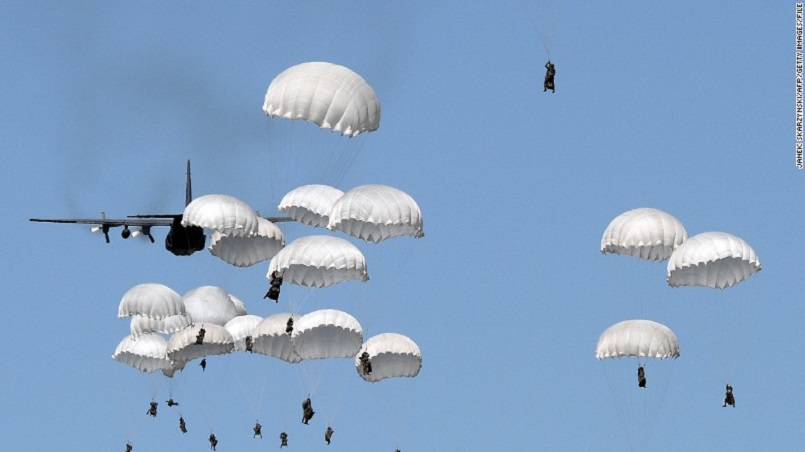
The UK has deployed hundreds of troops to Eastern Europe as NATO continues to bolster its presence in the face of perceived Russian provocation.
In the largest buildup of troops in the region since the Cold War, the UK has said it will send Royal Air Force Typhoon jets to Romania for up to four months in 2017.
Defense Secretary Michael Fallon also confirmed that 800 personnel will be moved to Estonia, 150 more than originally planned.
"Backed by a rising defense budget, this deployment of air, land and sea forces shows that we will continue to play a leading role in NATO, supporting the defense and security of our allies from the north to the south of the alliance," Fallon said.
Syrian conflict adds to tension
The announcement comes a week after a Russian fleet, which was reportedly en route to Syria, passed close to British waters.
On Wednesday, Russia withdrew a request for a flotilla of warships, including its flagship aircraft carrier the Admiral Kuznetsov, to refuel in the Spanish port of Ceuta as the ships head toward Syria.
Russian warships, likely headed to Syria, withdraw refueling request in Spain
In a statement, Spain's foreign affairs ministry said Russia withdrew the request after the ministry had asked the Russian Embassy in Madrid to clarify reports the flotilla might participate in military operations against the besieged Syrian city of Aleppo.
The Russian role in the Syrian conflict has exacerbated tensions between Moscow and NATO that have risen since Russia's annexation of the Crimea region from Ukraine in 2014.
On Wednesday, NATO Secretary General Jens Stoltenberg said that recent tactics by Moscow had forced the alliance to respond.
"Russia has tripled defense spending," Stoltenberg told reporters.
"Russia has invested heavily in a modern military equipment. They are conducting a large-scale, no-notice exercises close to NATO borders, but perhaps most importantly Russia has been willing to use military force against neighbors.
"We have seen that in Georgia and we have seen it in Ukraine with illegal annexation of Crimea and the continued destabilization of eastern Ukraine. So therefore NATO has to respond. "
Concerns over Baltic security
NATO defense ministers met Wednesday in Brussels, Belgium, to discuss the situation as well as the fight against ISIS.
The latest troop deployment comes at a time of fear over the security of Baltic states such as Latvia, Estonia and Lithuania, which have significant Russian-speaking minorities like Ukraine and concerns that they could suffer a similar fate to Crimea's.
Poland has already registered unease over Russia's move to bolster military options in its Baltic enclave of Kaliningrad, including the arrival of the Iskander missile system.
Kaliningrad has a 200-kilometer (124-mile) border with Poland, and the presence of military hardware has led to thousands of Poles joining local militias in response.
Poland's paramilitary defense has grown rapidly, with more than 35,000 people signing up and undergoing military training. They range from high school students to lawyers and doctors.
The United States and the UK are both set to send troops to Poland next year in a show of strength and support of their NATO ally.
"NATO does not seek confrontation with Russia," Stoltenberg said.
"We don't want a new Cold War, and we don't want a new arms race and therefore, what NATO does is defensive and it is proportionate.
"At the same time, NATO has to react when we, over a long period of time, have seen a substantial military buildup by Russia and we have seen them modernize their military capabilities and most importantly, we have seen them willing to use military force against neighbors."
Troops ready
In July, the UK said it would deliver one of four battalions to NATO's enhanced forward presence in the Baltic states and Poland.
According to the Ministry of Defense, the deployment is likely to include "armored Infantry, equipped with Warrior armored fighting vehicles, tactical UAVs (unmanned aerial vehicles), and a troop of our Challenger 2 main battle tanks."
UK troops are expected to begin their deployment in Estonia in May.
NATO has also said that Albania, Italy, Poland and Slovenia will contribute to a Canadian-led battalion in Latvia.
Belgium, Croatia, France, Luxembourg, the Netherlands and Norway will join a German-led battalion in Lithuania, while Denmark and France will contribute to the UK-led battalion in Estonia.
Romania and the UK will join the US-led battalion in Poland.
US action
In February, the US Department of Defense announced it was spending $3.4 billion for the European Reassurance Initiative to deter Russian aggression against NATO allies.
The initiative will include putting equipment in place in the Baltic states, Poland and Central Europe.
On Monday, Norway announced that US Marines would be deployed in the country, beginning in January.
A limited rotational force of 330 Marines are set to be located at the Vaernes military base in Norway, according to a statement from the Norwegian Defense Ministry.
Earlier this year, members of the 2nd Marine Expeditionary Brigade trained in Norway alongside troops from other NATO countries in Exercise Cold Response.
Norway shares a 196-kilometer (122-mile) border with Russia.
